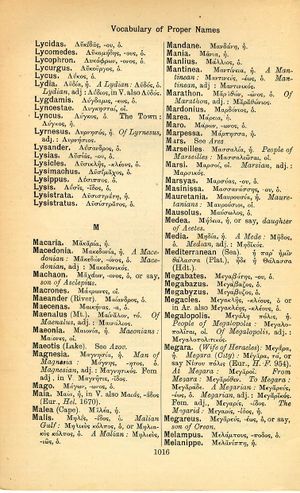Lycurgus
χαῖρ', ὦ μέγ' ἀχρειόγελως ὅμιλε, ταῖς ἐπίβδαις, τῆς ἡμετέρας σοφίας κριτὴς ἄριστε πάντων → all hail, throng that laughs untimely on the day after the festival, best of all judges of our poetic skill
English > Greek (Woodhouse)
Λυκοῦργος, ὁ.
Latin > English (Lewis & Short)
Lycurgus: i, m., = Λυκοῦργος.
I Son of Dryas, king of the Edones, who prohibited the worship of Bacchus to his subjects, and ordered all the vines to be destroyed, Ov. M. 4, 22; Prop. 4, 16, 23; Stat. Th. 4, 386; Hor. C. 2, 19, 16; Hyg. Fab. 132; 242.—
II Son of Pheres, a king of Nemea, Stat. Th. 5, 39. —
III Son of Aleus and Neæra, and father of Ancæus, a king of Arcadia; hence, Ly-curgīdes, ae, m., a male descendant of Lycurgus, i. e. Ancæus, Ov. Ib. 503; and: Lycŏorgīdes, ae, m., the same, Prisc. 584 P.—
The famous lawgiver of the Spartans, Cic. Div. 1, 43, 96; id. Rep. 2, 1; 2, 9, 5 sq.; id. Off. 1, 22, 76; Vell. 1, 6, 3 et saep.—
An Athenian orator, the contemporary and friend of Demosthenes, famed for his incorruptible integrity, Cic. Brut. 34, 130; id. de Or. 2, 23, 94.—Transf., for a severe magistrate: Lycurgos invenisse se praedicabat et Cassios, columina justitiae prisca, Amm. 30, 8, 13.—Hence, Lycur-gēi, ōrum, m., = Λυκούργειοι, disciples of Lycurgus, inflexibly severe: nosmetipsi, qui Lycurgei a principio fuissemus, cotidie demitigamur, Cic. Att. 1, 13, 3.

